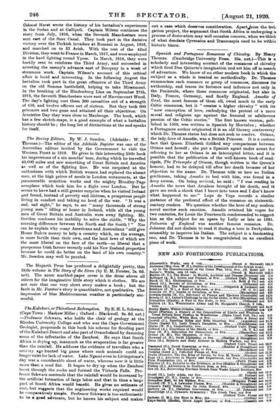Spanish and Portuguese Romances of Chivalry. By Henry Thomas. (Cambridge
University Press. 25e. net.)—This Is a scholarly and interesting account of the romances of chivalry which fired Don Quixote's imagination and set him off in search of adventure. We know of no other modem book in which the subject as a whole is treated so methodically. Dr. Thomas summarises each romance or group of romances, discusses its authorship, and traces its fortunes and influence not only in the Peninsula, where these romances originated, but also in Italy, France, Germany, and finally England. Amadis of Gaul, the most famous of them all, owed much to the early Celtic romances, but it " creates a higher chivalry " with its " new conception of love, embodying the protest of a more moral and religious age against the frenzied or adulterous passion of the Celtic stories." The first known version, pub- lished in 1508, was written in Spanish by Montalvo ; whether a Portuguese author originated it is an old literary controversy which Dr. Thomas states but does not seek to resolve. Oriana, the lady-love of Amadis, was a British Princess. It is a curious fact that Queen Elizabeth disliked any comparisons between Oriana and herself ; she put a Spanish agent under arrest for referring to her as Oriana in an intercepted letter, and it is possible that the publication of the well-known book of mad- rigals, The Triumphs of Oriana, though written in the Queen's honour, had to be delayed till after her death because of her objection to the name. Dr. Thomas tells us how an Italian gentleman, taking Amadis to bed with him, was found in a deep swoon. On being revived, he said : " I was reading in Amadis the news that Arcalaus brought of his death, and it gave me such a shock that I burst into tears and I don't know what happened to me." Lope de Vega records a similar instance of the profound effect of the romance on sixteenth- century readers. We question whether the hero of any modem novel excites such emotion. Amadis retained his vogue for two centuries, for Louis the Fourteenth condescended to suggest him as the subject for an opera by Lully as late as 1684. Palneerin of England was another famous romance. Dr. Johnson did not disdain to read it during a tour in Derbyshire, ostensibly to improve his Italian. The subject is a fascinating one, and Dr. Thomas is to be congratulated on an excellent piece of work.


































 Previous page
Previous page